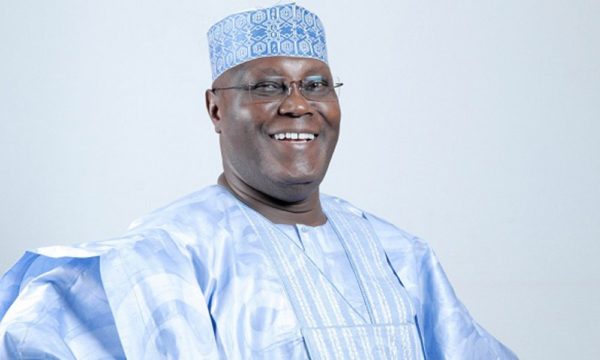The Supreme Court on Tuesday dismissed two appeals filed by the Peoples Democratic Party (PDP) and its Presidential Candidate, Atiku Abubakar, challenging two major decisions of the Presidential Election Petition Tribunal sitting in Abuja.
The petitioners had approached the apex court to set aside the decision of the tribunal which barred them from inspecting an alleged central server used in the country’s Feb.23 presidential election.
They had also invited the apex court to compel the tribunal to reopen argument on an application filed by the ruling party, All Progressive Congress (APC) that sought for expunge of some portions of the petition.
Giving ruling in the he appeal to access for the inspection of the alleged central server, Justice Centus Nweze, held that setting aside the decision of the tribunal on the matter would amount to pre-empting the substantial case.
Nweze said that the Justice Mohammed Garba-led five-man panel was right to stop the move by the petitioners to inspect the acclaimed central server allegedly managed by the Independent National Electoral Commission (INEC).
The judge held that: “the decision of the tribunal to prevent the inspection of the alleged server was apt and we do not have to set it aside at the point. The appeal has no merit and it hereby dismissed’’.
Ruling on the appeal seeking for the re-opening of argument on the motion filed by APC for the tribunal to expunge some portions of the petition, Nweze held that the action was statute barred and went ahead to dismiss it also.
NAN recalls that the petitioners had insisted that the “central server” was allegedly used by INEC to warehouse electronically transmitted results in the election.
The petitioners had approached the apex court to set aside the June 24, decision of the tribunal.
Atiku’s counsel, Eyitayo Jegede, SAN, had pleaded with the court to set aside the decision of the presidential election petition tribunal which refused to compel INEC to allow him access to the central server alleged used in the conduct of the presidential poll.
He said access to the INEC’s central server was germane to his client’s petition, adding that the court should order the electoral body to allow access to the database forthwith.
However, Chief Wole Olanipekun SAN, counsel to President Muhammadu Buhari, asked the court to turn down the request and to dismiss the appeal on the grounds that the appeal had become academic.
Olanipekun drew the attention of the court to the fact that the life of the appeal would expire on Aug. 21, adding that granting the request would no longer serve any purpose.
He further told the court that the parties would on Aug. 21 adopt their final written addresses at the tribunal preparatory to judgment.
Mr Yunus Usman, SAN, and Mr Charles Edosamwam SAN, counsel for the ruling party, All Progressive Congress (APC) both aligned themselves with the position canvassed by counsel for the president.
The petitioners also alleged that the tribunal denied them fair hearing by preventing them from accessing the “relevant and material evidence’’.
They submitted that the tribunal encouraged the breaching of Section 151(1) of the Electoral Act 2010 (as amended) by the electoral body.
They further alleged that the tribunal’s denial of fair hearing had so far undermined their petition.
According to them, the tribunal, in dismissing their application, fails to consider their uncontroverted evidence contained in their further affidavit in support of their application for access and inspection of information.
They maintained that the tribunal failed to exercise its discretion judiciously and judicially.
On the APC motion, the petitioners had challenge the proceeding of June 11 at the tribunal where they claimed APC ambushed them by secretly withdrawing a motion and replacing same with another not responded to.
The tribunal had in a unanimous decision on July 3, dismissed a prayer by the applicants to re-open arguments on the APC application that sought the expunge of portions of the petition.
The tribunal however, held that the petitioners failed to adduce cogent reasons why such request should be granted, having failed to file a counter affidavit against issues raised earlier.
The tribunal had on June 11 ruled that the petitioners failed to file counter affidavit against APC’s prayers on accounts of the petition’s unsubstantiated allegations of non-compliance and malpractices.
The tribunal had held that its record showed that the petitioners were duly served with APC’s motion on May 16 which gave them seven days to file their counter-affidavit.
The APC had urged the tribunal to strike out allegations of widespread malpractices made on the conduct of the presidential elections in 10 states from the petition.
The party alleged grave errors, adding that the petition was shrouded in unsubstantiated issues in the 10 states.
The party also claimed that Atiku merely made vague allegations of electoral malpractices in the 10 states, adding that vague allegations were unknown to law.
The States were Borno; Yobe; Jigawa; Kebbi; Kaduna; Kano; Gombe; Niger; Katsina; Bauchi states.
APC, had also in the motion invited the tribunal to strike out allegations of act of violence leveled against Vice President, Chief of Army Staff, Nigerian Army, Nigerian Police and several other individuals who were not listed as parties in the petition. (NAN)

